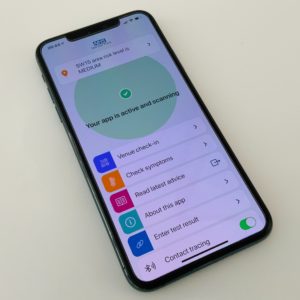NHS Covid-19 app to notify fewer contacts to isolate
The public is being urged to continue to use the NHS Covid-19 App as changes will result in fewer contacts being advised to self-isolate following close contact with a positive case.
As part of a review into the app announced by the health secretary, the ‘logic’ which underpins how close contacts are notified will be updated from today.
Currently, for people who input a positive test but are asymptomatic, the app looks for close contacts five days prior to a positive test. This will be updated based on public health advice to look back at contacts two days prior to a positive test.
The change will mean fewer contacts that took place when the positive case was unlikely to be at the peak of their infectiousness are advised to self-isolate, reducing the overall number of notifications sent by the app.
Health bosses say this update does not impact the sensitivity of the app, or change the risk threshold, and will result in the same number of high-risk contacts being advised to self-isolate.
However, Steve Turner, Unite’s assistant general secretary for manufacturing, said the change of guidance still falls short of the union’s calls for the government to exempt the automotive and steel sectors from self-isolation rules.
‘Unite has been pressing the government to exempt major manufacturing from the requirement for workers who continuously test negative to isolate if ‘pinged’ by the test and trace app because we have very real fears that UK work will be moved overseas and that continuous process manufacturing such as steel will be seriously damaged.
‘This change may make some difference but it falls short of what we have called for. Manufacturing workers share shifts so the two days decision may make little difference.
‘Sometimes whole shifts have been stuck at home as has been the case of late. The costs are horrific to workers and industry alike and there are real concerns that work will move overseas or even that steel furnaces could be damaged, which would be devastating for this industry.
‘We simply cannot have a situation, for example, where a blast furnace is shut down because workers are stuck at home, testing negatively daily, but forced to self-isolate. UK workers must not lose out because the government’s reopening of the economy is incoherent.
‘So I repeat the calls I made to the minister when we met last week: listen to us when we warn that the damage to UK PLC by the failure to exempt critical workers will be real and significant.
‘It must also ramp up daily testing, reverse its decision to end the free provision of lateral flow tests in July and allow those who actually test positive to be placed on furlough, not on the £96 per week statutory sick pay so many are forced to accept.
‘Additionally, it must reinstate mask-wearing on public transport and in confined public spaces and act now to restore public confidence in an app millions are currently deleting or disabling from their phones.’

This update comes as new analysis shows the NHS Covid-19 App continues to play a crucial role in breaking chains of transmission, preventing hospitalisations and saving lives.
New analysis from leading scientists shows that in the first 3 weeks of July, as cases were exponentially rising, the app averted up to 2,000 cases per day, and over 50,000 cases of Covid-19 including chains of transmission assuming 60% compliance with instructions to self-isolate. This is estimated to have prevented 1,600 hospitalisations.
It also shows the app reduces the spread of Covid-19 by around 4.3% each week, and for every 200-250 tests entered and shared in the app one person is prevented from being hospitalised from the virus.
Usage remains high, with around 40% of the eligible population regularly using the app and around 50% of all reported tests being inputted.
The government is urging the public to continue using the NHS Covid-19 App. Around one in three people experience this virus without symptoms and, even if you are fully vaccinated, it is possible that you could be unwittingly carrying and spreading the virus, creating a chain of transmission that could have someone vulnerable to the virus at the end of it.
Dr Jenny Harries, CEO of UK Health Security Agency, said: ‘The NHS Covid-19 App is a really practical example of how technology can be used to fight the biggest challenges we face in protecting and improving our health.
‘The app is the simplest, easiest, and fastest way to find out whether you have been exposed to the virus, and it has saved thousands of lives over the course of this pandemic.
‘I strongly encourage everyone, even those fully vaccinated, to continue using the app. It is a lifesaving tool that helps us to stay safe and to protect those closest to us as we return to a more familiar way of life.’
The app remains the fastest way to know if you have been at risk, and app users will only be advised to isolate if they have come into close contact with someone who has tested positive for Covid-19.
From August 16, fully vaccinated contacts in England will be exempt from isolation and instead will be advised to take a PCR test. Those who are not fully vaccinated will still be required to isolate, and it will remain a legal obligation to isolate if you test positive for Covid-19.
Health and social care secretary, Sajid Javid said: ‘We want to reduce the disruption that self-isolation can cause for people and businesses while ensuring we’re protecting those most at risk from this virus.
‘This update to the app will help ensure that we are striking the right balance. It’s so important that people isolate when asked to do so in order to stop the spread of the virus and protect their communities.’
Photo Credit – John Cameron















